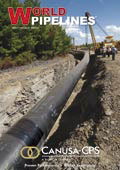Editorial comment
Politicians in the UK are finishing up a month’s worth of fierce campaigning ahead of the general election, which is to be held in the first week of May. Conservative, Liberal Democrat and Labour party campaigners, along with the smaller parties, have been travelling the length and breadth of this small isle trying to gain favour amongst the masses. This highly orchestrated PR tour sees alliances made and broken with key unions, business leaders and lobbyists, as we wait to see who will curry most favour (and, of course, win the majority of seats in the House of Commons) and form the next government.
Register for free »
Get started now for absolutely FREE, no credit card required.
In a similar vein, Russian President Dmitry Medvedev and Prime Minister Vladimir Putin have been on their own individual tours this week, travelling around Europe - not canvassing for votes but rather securing new natural gas contracts and partners for Russian-built pipelines.
So what was the itinerary? Medvedev spent some time in Oslo and managed to win access to Arctic resources, as Russia and Norway agreed on a plan to delimit their Arctic maritime border. Norway has declared that the way is now prepared for more activities and co-operation with Russia on gas field development – something that Russia had been long hoping for.
Putin visited Austria, where he witnessed the signing of agreements on Austrian participation in the South Stream gas pipeline project. In Italy, he then met Berlusconi to reaffirm the commitment of both countries to South Stream. Of course, he also squeezed in a quick dig at the Nabucco pipeline, saying, “Building a pipeline without supply contracts is pointless and extremely dangerous”.
In Copenhagen, Medvedev praised Denmark for being the first country to approve the Nord Stream pipeline and also hinted at a Russian initiative for a new European energy charter.
Closer to home, Russia and Ukraine are forging ahead with a consortium to modernise Ukraine’s huge gas pipeline network. This will strengthen Russia’s position in the region by improving infrastructure and keeping secure it’s main transit route to Europe. In return, Ukraine will receive discounts on gas imports from Russia. Medvedev and Putin may like to spend time touring the European capitals tying up pipeline deals and spreading Russian goodwill, but they must also be careful to pay attention to their closest neighbours.
In a general policy change, however, Russia does seem to be ready for more international co-operation in its energy sector; the government is considering making it easier for foreign countries to invest and is preparing a ‘Global Energy Code’ which is to replace the Energy Charter Treaty, aiming to “create global production and technology chains in the supply of Russian energy resources”, according to Valery Yazev, Vice President of the State Duma and Chairman of the Russian Gas Society.
It is in Russia’s interests to court international technical expertise, and to reach out to end customers in Europe, so as to broaden its influence and form relationships along the way. Yazev’s concept of “production and technology chains” of supply is telling: Russia is at once strengthened and bound by the international relationships it creates through Gazprom. New energy strategy should focus on lessening government control over investment in the energy sector, opening Russia up to the international market and just letting the market work it’s magic. Like a politician on a campaign trail, you’ve got to put yourself out there, declare your assets, open yourself up to criticism and hope the people see your potential.


